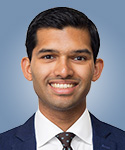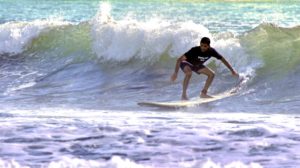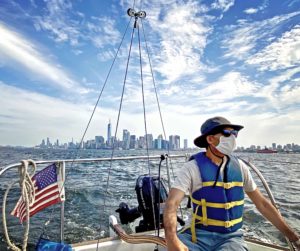May 17th, 2021
“Feel the Musicality”: How Do Surgeons Learn?
Vivek Sant, MD

Dr. Sant is a General Surgery Chief Resident at NYU Langone Health, Bellevue Hospital, and Manhattan VA in New York, NY.
My friends and I spent Thanksgiving 2018 attending surf school in Jacó, Costa Rica. We spent that week fully immersed in twice-daily surf sessions interspersed with conditioning, balance exercises, and of course, downtime to explore the town and rainforests of Jacó. Having been on a surfboard only a handful of times previously, this was a new experience for me. Our surf instructors quickly got us out on the water, and onto wave after wave, helped us start to stand up on our surfboards. During video review of one of our surf sessions, our head instructor explained to us that the key to surfing was to “feel the musicality.” While I noticed a few raised eyebrows in response, this exhortation immediately resonated with me, through my experiences learning other skills, as well as through my surgical training.
My mentors often remind me that the learning that happens in residency is only the beginning of a lifelong journey: 20 years into practice, 80% of the procedures one will be performing will be ones learned after residency. Of course, 5 years of surgical training provide a firm foundation, but how does one develop the tools to learn more easily, efficiently, and constantly? In residency, we need to learn how to keep learning. As I have cultivated other hobbies and skills over the years, I have found common themes emerge regarding how I learn best. These themes overlap significantly with how I have approached my own surgical training.
In college, I took up guitar. I was largely self-taught, from online tutorials and YouTube videos. I can still remember going from being barely able to curl my fingers around the guitar fretboard without significant pain, to playing my first chord, to eventually strumming through an entire song. I practiced the riffs from Sultans of Swing so many times one summer, that my family still cannot hear that song without a visceral reaction. I would occasionally hit a wall while practicing. I would practice 40 or 50 repetitions on a particular riff and still not have it come out perfectly. The next day I would wake up, pick up my guitar, and find my fingers able to effortlessly play the same riff I had been struggling with the previous night. Time after time, I have found this process repeating itself. Get the repetitions in. And then keep the faith. In surgical residency, especially in the early years, I found myself practicing a certain maneuver or procedure, wondering if it would ever make sense — and with practice, over time, it always has.
In the summer of 2017, I set my sights on a lofty goal — sailing a boat in the Mediterranean to Santorini. The only obstacle? I had no idea how to sail. But how hard could it be to learn? I started by taking two weekend-long courses — the American Sailing Association 101 and 103 courses, Basic Keelboat Sailing and Basic Coastal Cruising. I then went on numerous practice sails with an instructor to gain experience, and took an extensive online sailing theory course, learning about docking in various winds and currents, basic engine repair, and the effects of the sun and moon on tides and the weather. As my eyes opened to the vast body of knowledge I would have to master, Santorini seemed to be falling farther away from me, so I set an intermediate goal — sailing a boat by myself, locally. That fall, a friend and I solo-chartered a sailboat in Key West for a week. As prepared as I was from my courses and practical training, nothing could have truly prepared me for that final leap of independence. With no one to fall back on for advice, a new phase of learning commenced, and I grew tremendously from this experience. In surgical training, opportunities for independence result in tremendous surgical maturation, and in my chief year, I have come to greatly appreciate these opportunities.
One of the hobbies I pursued in medical school was ice skating, toward my larger goal of learning how to play ice hockey. A medical school classmate took me to buy hockey skates and then took me out on the ice for the first time. Like learning to ride a bike, there was a significant disconnect between watching others glide effortlessly on the ice and doing so myself. I would wake up early on Sunday mornings, watch ice skating tutorials online, then take the subway down to Bryant Park and practice for a few hours. I learned quickly that words and instructions are only a coarse approximation of a complex set of moves that you ultimately have to feel out, discover, and eventually master for yourself. In early sessions, with the benefit of a beginner’s mindset, I could fall on the ice multiple times and think nothing of it. But as I progressed, I found myself trying to avoid falling, and in the process, risking less and advancing less. So I resolved that I would lay it all on the line and push myself until I fell at least once every session. In surgical training, similarly, I have found great value in embracing discomfort. Leaning into the discomfort that accompanies a lack of knowledge, technical skills, or expertise and pushing past it has motivated me to grow tremendously. In residency, every 4 weeks, when we finally become comfortable on a service, we are whisked away to the next rotation, so we continue to progress, advance, and learn.
What exactly is this musicality one feels when surfing, sailing, ice skating, playing guitar, or even performing surgery? With a surfboard under your feet, you strive to feel a oneness between your mind, body, feet, surfboard, waves, and the ocean at large, so that you feel the exact right moment to get up on the board and drop in on a wave. Instead of having to think through the complexity of which way to turn the sails, tiller, and boat, given the wind angle, point of sail, and direction you want to go, you instead feel the water streaming past the tiller of your boat and the pull of the wind on the sails and instinctively push the tiller in just the right amount and direction needed to adjust your course. Instead of focusing on how the tutorial video said to “make c loops on the ice with the inside edge of your skates,” you relax and instead feel the traction between your feet, skates, and the ice, and the balance of your body, and adjust your position as needed to continue the motion you want. Your brain no longer has to calculate what key a song is in, figure out what notes are part of that scale, and then what frets and strings are used for that scale; instead, your fingers move to make music and express the song coursing through your mind! But how do we get to this joyous unconscious stage of expertise? How do we use our surgical instruments as unconscious extensions of our fingers and hands, and learn to separate tissues in accord with their natural tissue planes, in the beautiful dance that is surgery? Embrace the discomfort. Put the repetitions in. Then, keep the faith. And with humility and grace, in that final leap to independent practice, you’ll find yourself more than capable of serving your patients.





Vivek, I just started relearning piano, and something recently clicked about the muscle memory of transposing basic chords to different keys. This really resonated! Even coming from a non-surgical specialty, I find that there are myriad ways to find rhythm in medicine, whether it’s literally analyzing that of the heart, or the workflow of a service.
Thank you for sharing your experience. As this is my last year in surgical residency, what you’ve said “we need to learn how to keep learning” was really impressive to me. Hope that I could learn how to do music, surfing and sailing.